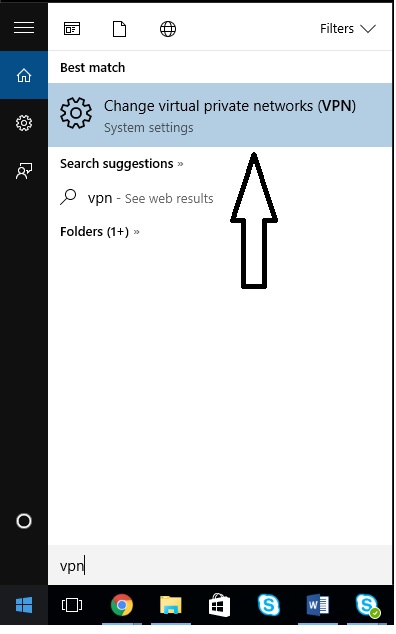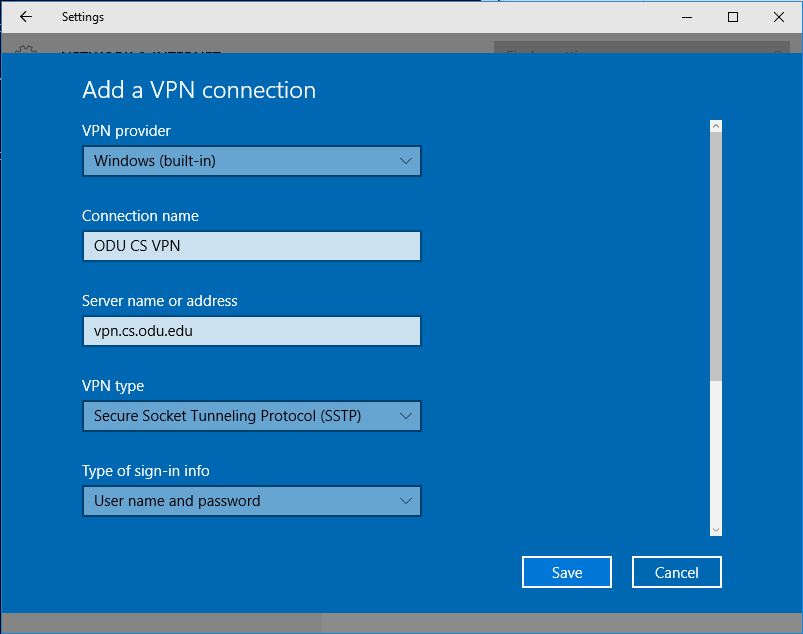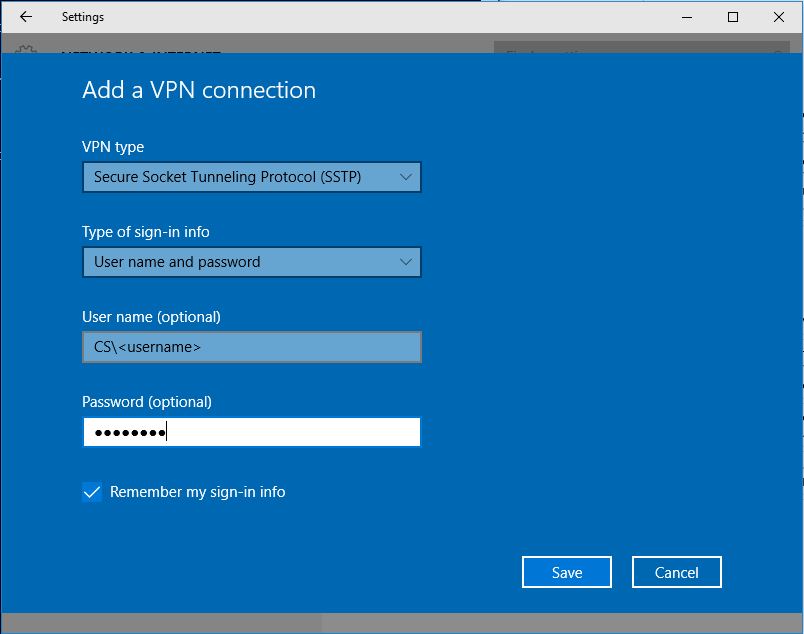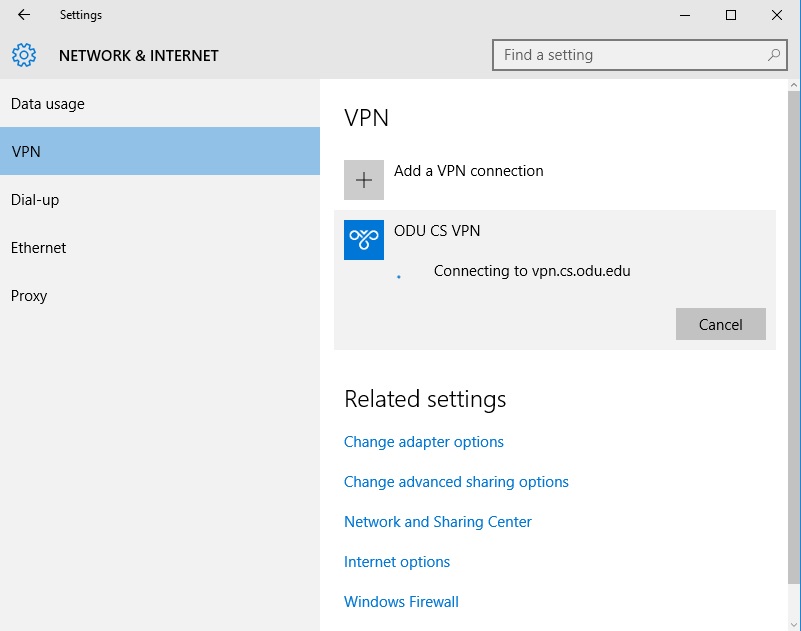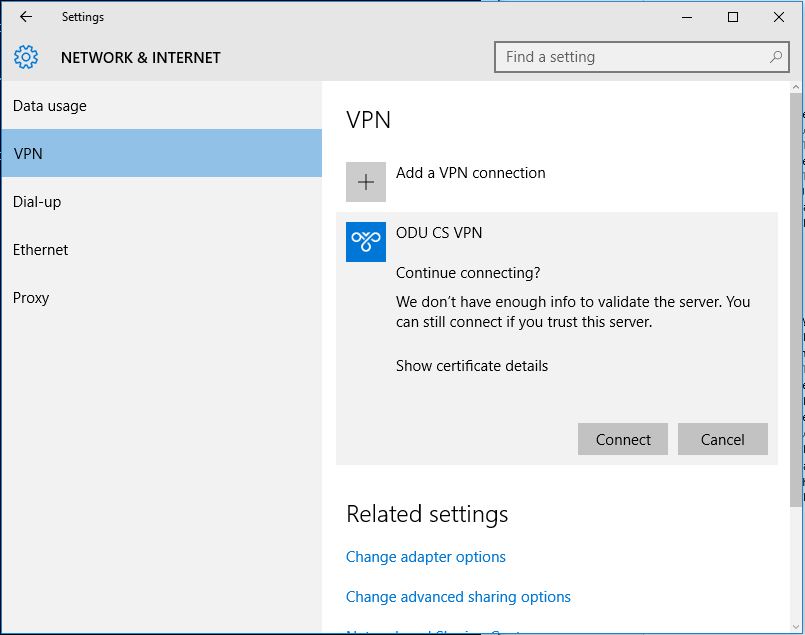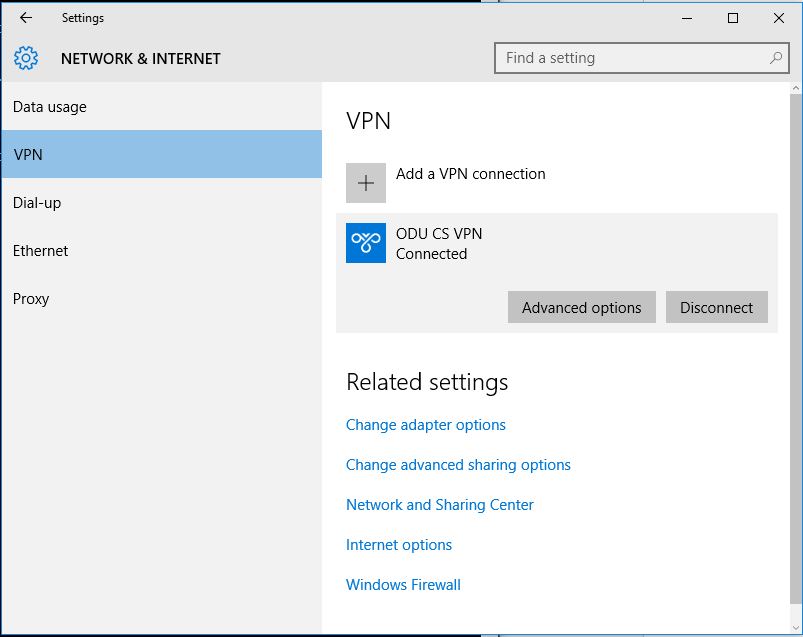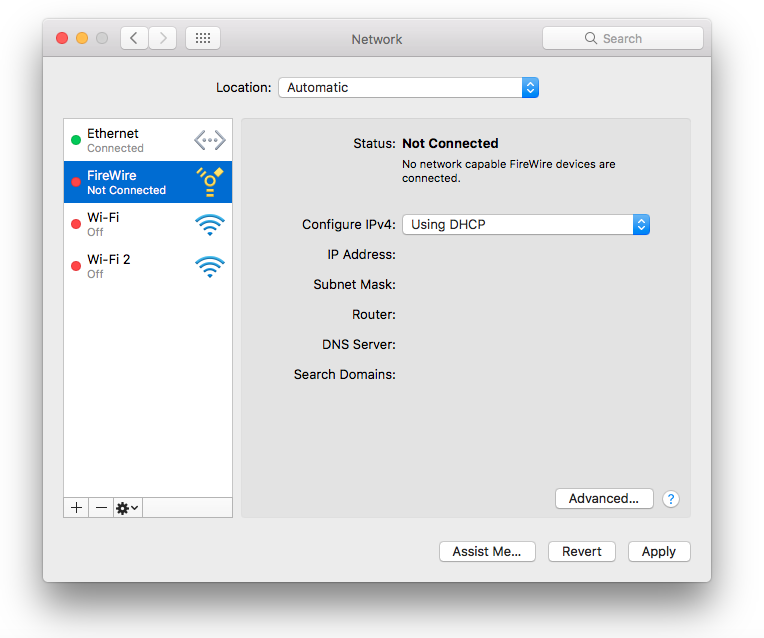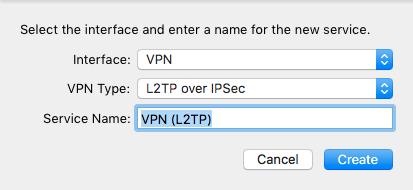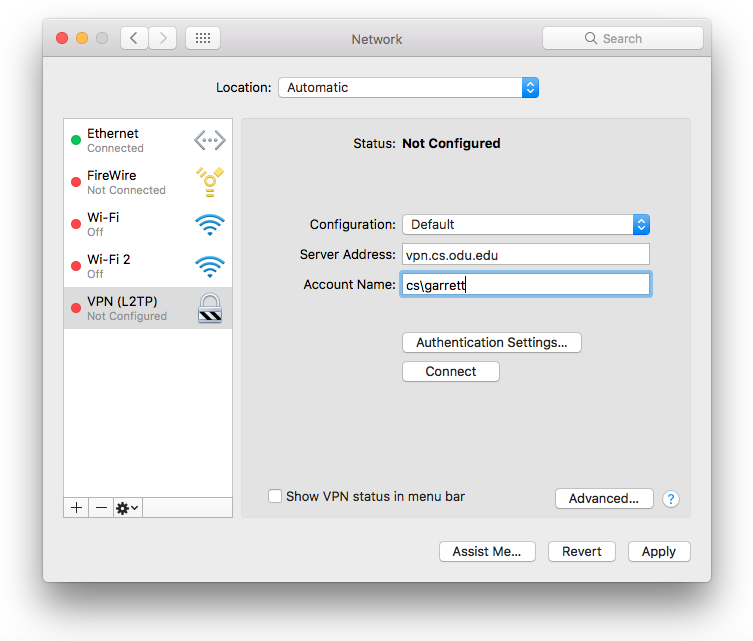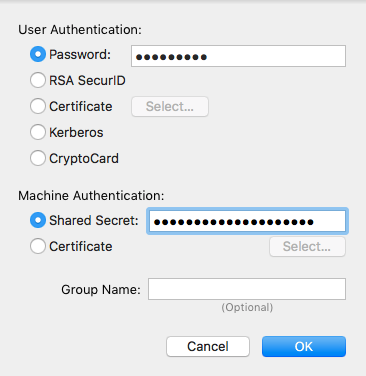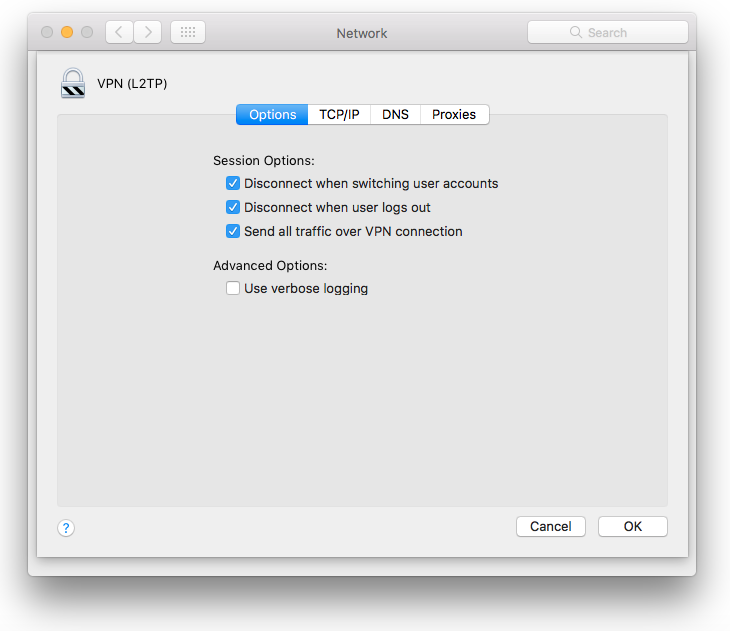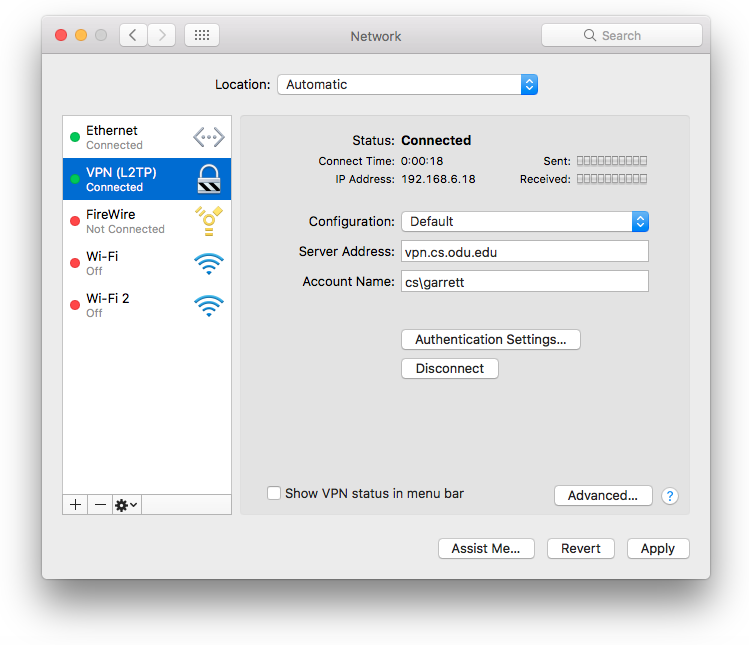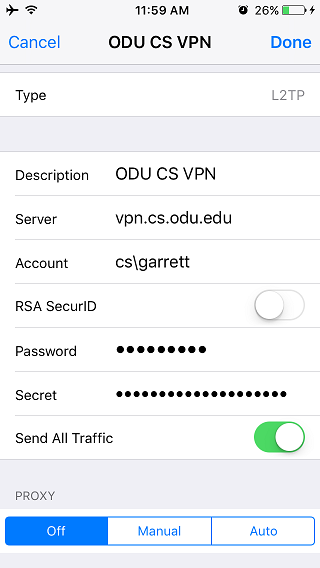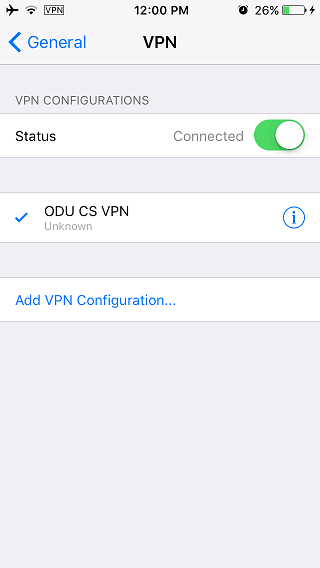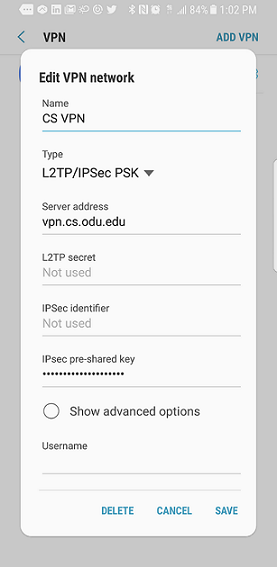Difference between revisions of "VPN Services"
(→Connecting with Android) |
(→Connecting with Android) |
||
| Line 147: | Line 147: | ||
The following instructions are for connecting an Android phone to our VPN. | The following instructions are for connecting an Android phone to our VPN. | ||
| − | '''1)''' To begin, go to the Android Settings -> Connections -> More connection settings -> VPN, then click on ' | + | '''1)''' To begin, go to the Android Settings -> Connections -> More connection settings -> VPN, then click on 'Add VPN' to setup a new VPN connection. |
'''2)''' Your configuration should follow the same syntax as shown below. Choose 'L2TP/IPSec PSK' for Type and enter 'vpn.cs.odu.edu' for the Server Address field. Your account should be set as 'CS\<username>' and your password as your respective CS username's password. Then, please either copy & paste or directly input our VPN shared secret found below into the 'IPsec pre-shared key' field. | '''2)''' Your configuration should follow the same syntax as shown below. Choose 'L2TP/IPSec PSK' for Type and enter 'vpn.cs.odu.edu' for the Server Address field. Your account should be set as 'CS\<username>' and your password as your respective CS username's password. Then, please either copy & paste or directly input our VPN shared secret found below into the 'IPsec pre-shared key' field. | ||
Revision as of 18:15, 18 October 2017
The ODU CS Department provides a VPN connection for those who wish to access our private CS Department network services from a remote location. This can be accessed with vpn.cs.odu.edu.
If you have any issues after following the instructions for connecting on this page, please email root@cs.odu.edu with a detailed description of your problem.
Contents
What is a VPN?
In summary, a VPN (Virtual Private Network) allows you to connect securely to a network (i.e. the ODU CS network) and access private network resources that aren't available outside of the network. When you connect to the CS Department VPN, no matter where you are in the world, it is similar to connecting your computer directly to our departments wireless Internet. For more information in a VPN, please visit here.
Connecting with a Windows Machine
The following instructions are for Windows 10. Setting up a VPN connection with another Windows OS follows the same general guidelines and information input.
1) Click on the Windows Start Menu as shown below.
2) Type in 'vpn' in the Search Box and click on 'Change virtual private networks (VPN)' as shown below by the black arrow.
3) Click on 'Add a VPN connection', and type in the info for the new VPN connection as shown below.
Scroll down to type in your CS credentials as shown below and then click 'Save'.
4) Click on the new 'ODU CS VPN' connection that was made and click 'Connect' to begin connecting to the VPN as shown below.
If given the 'Continue connecting?' message displayed below, click 'Connect'.
You should now be connected to the ODU CS VPN with a screen similar to the one below.
Note: If you still get an error after trying to connect, your VPN client may require the additional configuration:
1) Press the start menu and search for "Network and Sharing Center," and open this menu.
2) On the left side menu, select "Change Adapter Settings." Right click the VPN connection and select "Properties."
3) Under the "Security" tab, click the dropdown menu under "Type of VPN:" and make the selection "Secure Socket Tunneling Protocol (SSTP)."
If you are still experiencing trouble, please email us at root@cs.odu.edu.
Connecting with a Mac Machine
1) To begin your Mac OS VPN setup, go to System Preferences found in the "Start Menu".
Go to Network.
2) From the Network Menu, choose the + button at the bottom left to create a new Network Connection.
3) Change the 'Interface' option to VPN and the 'VPN Type' to L2TP over IPSec as shown below and then click 'Create'.
4) Type in vpn.cs.odu.edu for the 'Server Address' field and your CS account's username for the 'Account Name' field as shown below.
5) Click on 'Authentication Settings...' and input your CS account's password into the 'Password' field. Under 'Machine Authentication', please either copy & paste or directly input our VPN shared secret found below into the 'Shared Secret:' field, then click 'OK'
VPN Public Shared Secret: 2ZRFGjMlCmdXI13er5u2
Note: If you are directly typing this shared secret, the character between M & C is a lowercase L, and the character between X & 1 is a uppercase i.
6) Next click on 'Advanced...' and under Options, place a check in the box next to 'Send all traffic over VPN connection' and then click 'OK'.
7) Now, click 'Apply' to apply the VPN configuration changes, and then click 'Connect'. You should then see a screen similar to the one below verifying that you are connected to our VPN.
You have now successfully connected to our CS's virtual private network.
If you have any problems with connecting to our VPN or other questions, please email root@cs.odu.edu.
Connecting with an iOS
The following instructions are for connecting Apple's iPhone to our VPN.
1) To begin, go to the iPhones Settings -> General -> VPN, then click on 'Add VPN Configuration...' to setup a new VPN connection as shown below.
2) Your configuration should follow the same syntax as shown below. Choose 'L2TP' for Type and enter 'vpn.cs.odu.edu' for the Server field. Your account should be set as 'CS\<username>' and your password as your respective CS username's password. Then, please either copy & paste or directly input our VPN shared secret found below into the 'Secret' field.
VPN Public Shared Secret: 2ZRFGjMlCmdXI13er5u2
Note: If you are directly typing this shared secret, the character between M & C is a lowercase L, and the character between X & 1 is a uppercase i.
Finally, make sure 'Send All Traffic' is enabled, then click 'Done'.
3) Once back to the main VPN page, you should see your newly created VPN configuration. Please enable the status field to begin connecting to our VPN, where you should see a similar screen once successfully connected to our VPN as shown below.
You have now successfully connected to our CS's virtual private network through iOS.
If you have any problems with connecting to our VPN or other questions, please email root@cs.odu.edu.
Connecting with Android
The following instructions are for connecting an Android phone to our VPN.
1) To begin, go to the Android Settings -> Connections -> More connection settings -> VPN, then click on 'Add VPN' to setup a new VPN connection.
2) Your configuration should follow the same syntax as shown below. Choose 'L2TP/IPSec PSK' for Type and enter 'vpn.cs.odu.edu' for the Server Address field. Your account should be set as 'CS\<username>' and your password as your respective CS username's password. Then, please either copy & paste or directly input our VPN shared secret found below into the 'IPsec pre-shared key' field.
VPN Public Shared Secret: 2ZRFGjMlCmdXI13er5u2
Note: If you are directly typing this shared secret, the character between M & C is a lowercase L, and the character between X & 1 is a uppercase i.
Finally, click 'Save'.
3) Once back to the main VPN page, you should see your newly created VPN configuration for you to connect with.
You have now successfully connected to our CS's virtual private network through an Android phone.
If you have any problems with connecting to our VPN or other questions, please email root@cs.odu.edu.

